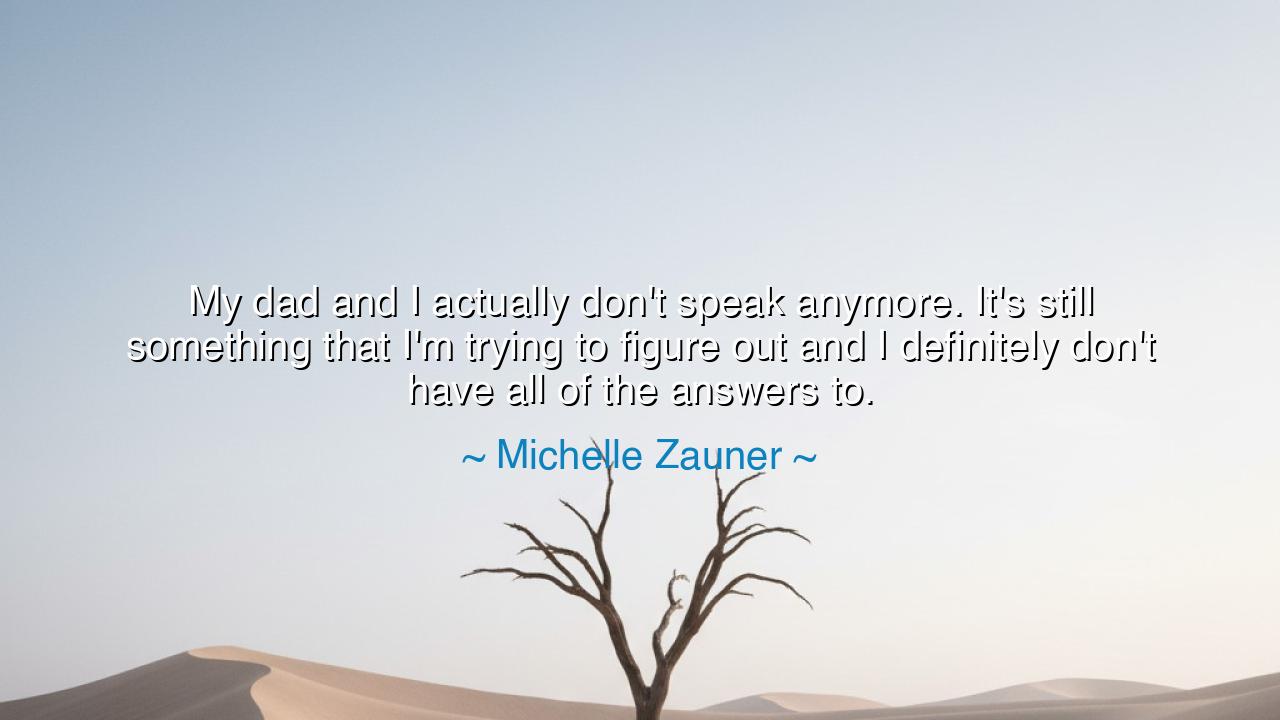
My dad and I actually don't speak anymore. It's still something
My dad and I actually don't speak anymore. It's still something that I'm trying to figure out and I definitely don't have all of the answers to.






“My dad and I actually don’t speak anymore. It’s still something that I’m trying to figure out and I definitely don’t have all of the answers to.” — Michelle Zauner.
In these quiet, trembling words, Michelle Zauner, the artist and author known for her memoir Crying in H Mart, opens the door to one of humanity’s oldest and deepest sorrows — the fracture between parent and child. It is a grief not always marked by death, but by silence — the silence of words unsaid, of love unspoken, of understanding unmet. When she confesses, “I don’t have all the answers,” she speaks not only for herself, but for all who wander the difficult terrain of family wounds. For in that space between kin lies a mystery as ancient as the heart itself: how love, which binds so deeply, can also divide so painfully.
The origin of this quote is not found in myth or scripture, but in the lived truth of a modern soul. Michelle Zauner, whose music under the name Japanese Breakfast and whose writing have both explored themes of loss and identity, lost her mother to cancer — a grief that left her untethered, searching for meaning. Yet even as she mourned that loss, she faced another — the estrangement from her father, a wound not of death but of distance. Her words reveal not bitterness, but a weary honesty — the recognition that not every rift can be neatly mended, and not every heart fully understood.
The ancients too knew this sorrow. Consider the story of King Lear, who, in his folly, divided his kingdom among his daughters but lost their love in return. In his final days, he wept not for his lost crown, but for the love he could not hold. The pain between parent and child is timeless — it reaches from the hearths of ancient kings to the quiet rooms of modern homes. It is the ache of generations failing to meet in the middle, of pride and hurt building walls where there should be embrace. Even Lear, in all his power, could not command reconciliation. So too, Michelle Zauner’s confession reminds us that healing cannot always be forced — it must ripen like fruit in its own season, if at all.
And yet, her words also carry a strange kind of hope. When she says, “I’m still trying to figure it out,” she admits that the story is not over. This is not resignation — it is the beginning of understanding. The soul, even when wounded, still seeks the light. To “not have all the answers” is not failure; it is humility before the mystery of love and pain. The ancients would call this the beginning of wisdom: to stand before the brokenness of life and not turn away, but to look upon it with patience, compassion, and courage.
There is power in this vulnerability. For to speak of estrangement is to defy the silence that so often swallows it. Many carry such pain in secret, ashamed or afraid to name it. Yet when one voice — like Zauner’s — admits, “I don’t have all the answers,” it grants permission for others to do the same. This act of truth-telling transforms grief into communion, loneliness into understanding. In this way, her confession becomes a kind of healing, not just for herself, but for all who listen.
We might recall, too, the story of Jacob and Esau, brothers torn apart by betrayal. For years, they lived in separation and anger, until one day, when they met again, Esau embraced Jacob and wept. Nothing had been resolved with words or logic — only the passing of time, and the recognition that love endures beyond pride, allowed their reconciliation. This, too, may be the road Michelle’s heart travels — or perhaps not. The lesson is not in whether reconciliation comes, but in learning to live with the unknown, and to let compassion guide the waiting.
So let this be the wisdom drawn from her sorrow: we are not meant to have all the answers. Family, love, and forgiveness are not equations to be solved, but mysteries to be lived. When silence falls between hearts, do not rush to fill it with blame — sit with it, listen to it, and seek to understand its language. Reach out if you can, and if you cannot, tend to your own heart until it is ready. For sometimes, the greatest act of love is not fixing the past, but holding space for the possibility of healing.
Thus, remember her words not as despair, but as an invocation to patience and compassion. Love endures, even through silence. To live without all the answers is not weakness — it is the strength of the seeker, the courage of the one who continues to hope, even when the path home remains uncertain.






AAdministratorAdministrator
Welcome, honored guests. Please leave a comment, we will respond soon